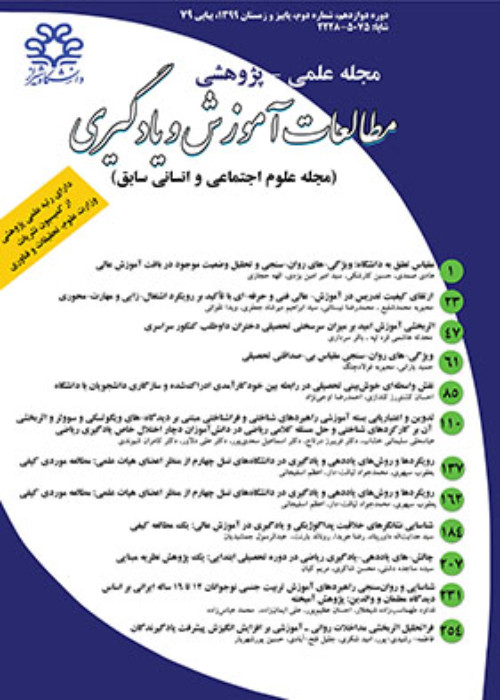Relationship of Sense of Humor with Stress and Coping Styles in University Students
Author(s):
Abstract:
IntroductionModern life is full of deadlines, frustrations, demands and ultimately stress. Indeed, Stress is a common problem that affects almost all of us at some point in our lives. We should learn to manage stress and to cope with it as stress management is rapidly growing in different countries. The goals of these stress management techniques (e.g. physical exercise, biofeedback, relaxation, deep breathing, meditation, etc) and coping styles (e.g. effective coping styles and ineffective coping styles) are to produce muscle relaxation and the easing of psychological tensions that goes with it; as a result people have to spend tremendous amounts of time, effort and money learning special relaxation techniques. While the sense of humor without time and exorbitant expense (unlike stress management techniques and coping styles) will decrease stress. Sense of humor plays a powerful and unique role in human life, with wide-ranging effects on many aspects of functioning. Sense of humor is therapeutic, providing a mechanism for coping with daily stressors and having positive effects on the muscle relaxation, control of pain and discomfort, less fatigue as well as psychological health. Thus, sense of humor has often been conceptualized as a form of coping in that it appears to buffer an individual against the negative effects of stress.Research QuestionOn this basis, the primary aim of the present study was to investigate the sense of humor and stress. Specifically, we addressed questions relating to relationships between sense of humor and its components (enjoyment of humor, laughter, verbal humor, sense of humor in social relations and sense of humor in stressful conditions) with stress. We evaluated the correlation between sense of humor and its components with coping styles (effective coping styles and ineffective coping styles). Finally, we investigated whether the sense of humor components are able to predict stress.MethodSubjects participating in this project were 320 male and female students of Isfahan University (with average age of 22 years) selected using stratified random cluster sampling. The three questionnaires were administered simultaneously to the participants. The Sense of Humor Questionnaire (SHQ) (Khoshouei, Oreizy and Aghaei, 1386) was used to assess sense of humor. The SHQ is a scale of 25 items that consist of five different components: enjoyment of humor, laughter, verbal humor, sense of humor in social relations and sense of humor in stressful conditions. The SHQ rates each item based on a seven-point Likert-type scale, ranging from strongly agree to strongly disagree. A high score on this test is associated with a person having a great sense of humor. The Social Readjustment Rating Scale (SRRS) (Holmes and Rahe, 1967) was used to assess stress, to measure stress according to the Holmes and Rahe Stress Scale, the numbers of "life change units" that apply to events in the past year of an individual's life are added and the final score gives a rough estimate of how stress affects health. Finally the Coping Style Scale (CSS) (Carver, Scheier and Weintraub, 1989) to assess coping style was administered; The CSS is a scale of 60 items that consist of two coping styles: effective coping styles (e.g. problem-focused and positive emotional-focused styles) and ineffective coping styles (e.g. negative emotional-focused styles)ResultThe results of Pearson’s correlation coefficient showed that sense of humor and its components have negative correlations with the stress and ineffective coping styles at P<0.05 level of significance. These correlations coefficients have a range from -0.12 to -0.31 for stress and from -0.11 to -0.32 for ineffective coping styles. However, the findings showed sense of humor and its components have positive correlations with the effective coping styles at P<0.05 level of significance. These correlations coefficients have a range from 0.27 to 0.81. Finally results of analysis of stepwise regression showed that among sense of humor components, enjoyment of humor, verbal humor, sense of humor in social relations, and sense of humor in stressful conditions are able to predict stress.DiscussionThe results of this study indicated that there is a negative relationship between sense of humor and stress. In addition, the present findings highlight that although coping styles can induce the stress but only one form of coping style (effective coping styles) linked to sense of humor. Moreover, results imply that sense of humor components (except laughter) are able to predict a considerable part of stress, or rather the stress is influenced by sense of humor through enjoyment of humor, verbal humor, sense of humor in social relations and sense of humor in stressful conditions. Altogether, results of this study were consistent with previous research in other countries. This finding has not only some important implications for other researchers of this field, but can also be generalized to aid in real-life settings. Also further research is needed to substantiate results of this research in other communities.
Language:
Persian
Published:
Studies in Learning & Instruction, Volume:1 Issue: 1, 2009
Page:
87
magiran.com/p966206
دانلود و مطالعه متن این مقاله با یکی از روشهای زیر امکان پذیر است:
اشتراک شخصی
با عضویت و پرداخت آنلاین حق اشتراک یکساله به مبلغ 1,390,000ريال میتوانید 70 عنوان مطلب دانلود کنید!
اشتراک سازمانی
به کتابخانه دانشگاه یا محل کار خود پیشنهاد کنید تا اشتراک سازمانی این پایگاه را برای دسترسی نامحدود همه کاربران به متن مطالب تهیه نمایند!
توجه!
- حق عضویت دریافتی صرف حمایت از نشریات عضو و نگهداری، تکمیل و توسعه مگیران میشود.
- پرداخت حق اشتراک و دانلود مقالات اجازه بازنشر آن در سایر رسانههای چاپی و دیجیتال را به کاربر نمیدهد.
In order to view content subscription is required
Personal subscription
Subscribe magiran.com for 70 € euros via PayPal and download 70 articles during a year.
Organization subscription
Please contact us to subscribe your university or library for unlimited access!


